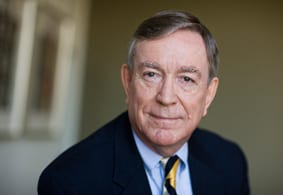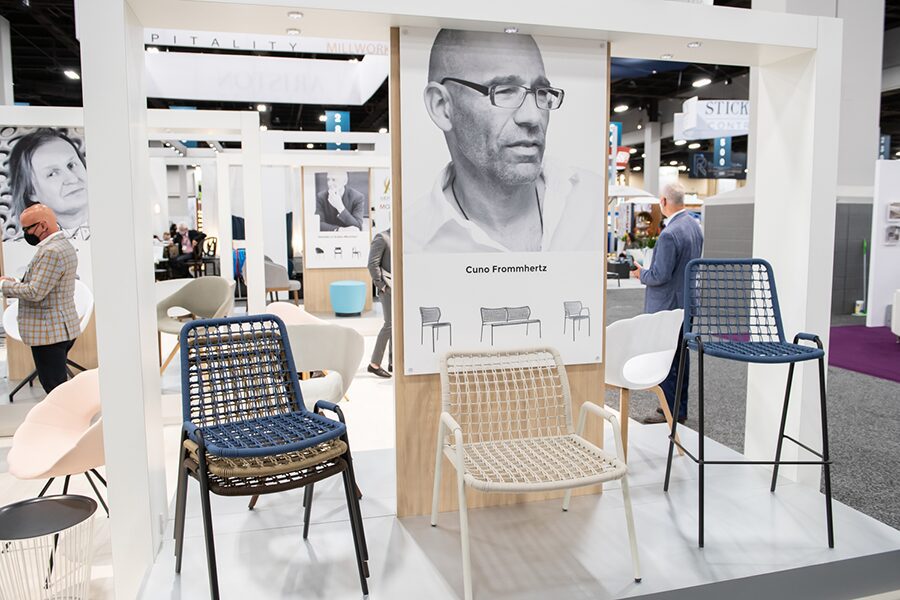 Ray C. Anderson, the founder and chairman of Interface and a visionary who implemented radically new processes for the manufacture of carpet to be more sustainable and healthful, died of cancer on Monday, August 8. He was 77. Anderson founded Interface in 1973 to produce the first free-lay carpet tiles in the United States, and the company grew to be the world’s largest producer of modular commercial floorcoverings. Anderson’s leadership transformed Interface and its products, the carpet industry overall, and the design professions in general.
Ray C. Anderson, the founder and chairman of Interface and a visionary who implemented radically new processes for the manufacture of carpet to be more sustainable and healthful, died of cancer on Monday, August 8. He was 77. Anderson founded Interface in 1973 to produce the first free-lay carpet tiles in the United States, and the company grew to be the world’s largest producer of modular commercial floorcoverings. Anderson’s leadership transformed Interface and its products, the carpet industry overall, and the design professions in general.
“Interface and the world have lost a great man today,” says Dan Hendrix, president and CEO of Interface. “Ray was and continues to be our company’s heart and soul. His iconic spirit and pioneering vision are not only his legacy, but our future. We will honor Ray by keeping his vision alive and the company on course.”
The moment that changed Anderson came in 1994, when he read Paul Hawken’s The Ecology of Commerce. Hawken’s text inspired Anderson to transform Interface.
Anderson said, in a quote on the Interface website: “In 1994, at age sixty and in my company’s twenty-second year, I steered Interface on a new course-one designed to reduce our environmental footprint while increasing our profits. I wanted Interface, a company so oil-intensive you could think of it as an extension of the petrochemical industry, to be the first enterprise in history to become truly sustainable-to shut down the smokestacks, close off its effluent pipes, to do no harm to the environment and take nothing not easily renewed by the earth. Believe me when I say the goal is one enormous challenge.”
Anderson’s legacy is Mission Zero, which is Interface’s plan to eliminate any negative impact it may have on the environment by 2020. Interface aims to accomplish this through the redesign of processes and products, the pioneering of new technologies, and efforts to reduce or eliminate waste and harmful emissions while increasing the use of renewable materials and sources of energy. Since Anderson’s 1994 epiphany, Interface says it has reduced greenhouse gas emissions by 35 percent, fossil fuel consumption by 60 percent (favoring renewable forms of energy), waste to landfill by 82 percent, and water use by 82 percent.
Anderson authored two books, Mid-Course Correction (1998) and Confessions Of A Radical Industrialist (2009). In Mid-Course Correction, Anderson described his vision for Interface: “If we’re successful, we’ll spend the rest of our days harvesting yester-year’s carpets and other petrochemically derived products, and recycling them into new materials; and converting sunlight into energy; with zero scrap going to the landfill and zero emissions into the ecosystem. And we’ll be doing well … very well … by doing good. That’s the vision.”
Anderson was co-chair of the President’s Council on Sustainable Development during President Clinton’s administration, and co-chaired the Presidential Climate Action Plan in 2008, which presented the Obama Administration with a 100-day action plan on climate.
A 1956 industrial engineering graduate of Georgia Tech, Anderson, in partnership with Interface, established the Anderson-Interface Chair in Natural Systems at Georgia Tech. The current chair holder, Associate Professor Valerie Thomas, conducts research in sustainability.
On August 5, three days prior to his death, Anderson was awarded an Honorary Doctorate at the Georgia Tech summer commencement for his work to secure a greener world for future generations and his championing of the business case for sustainability. Due to his illness, he was unable to attend in person but his acceptance remarks were read to the audience: “To be acknowledged with this award from my alma mater is a special honor. I hope that in accepting this we place another spotlight on our company’s efforts to eliminate negative impact on the environment. We refer to this as Mission Zero. And we hope it inspires the future business leaders in the audience of 900 graduates to carry this message with them into the companies they will work for tomorrow and well into the future.”
Anderson concluded many of his speeches with a poem called “Tomorrow’s Child,” written by Glenn Thomas, an Interface employee. Thomas was inspired to write this after hearing Anderson.
Tomorrow’s Child
Without a name; an unseen face
and knowing not your time nor place
Tomorrow’s Child, though yet unborn,
I met you first last Tuesday morn.
A wise friend introduced us two,
and through his sobering point of view
I saw a day that you would see;
a day for you, but not for me
Knowing you has changed my thinking,
for I never had an inkling
That perhaps the things I do
might someday, somehow, threaten you
Tomorrow’s Child, my daughter-son
I’m afraid I’ve just begun
To think of you and of your good,
Though always having known I should.
Begin I will to weigh the cost
of what I squander; what is lost
If ever I forget that you
will someday come to live here too.
Learn more about Ray Anderson and his legacy at www.interfaceglobal.com.
Source: Contract


